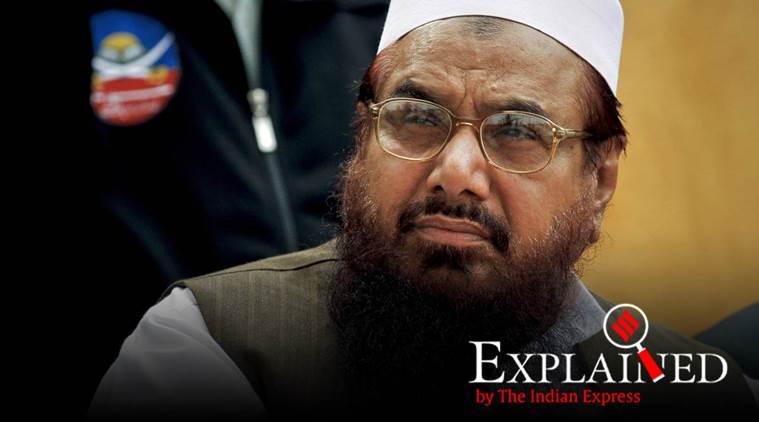Edited by Explained Desk |Mumbai |Updated: February 22, 2019 6:37:10 pm
Explained: Why Pakistan re-imposing ban on Jamat-ud-Dawa is an eyewash
Pakistan has always gambled that its strategic location at the crossroads of the world will prevent the worst from happening to it.

Pakistan’s decision to re-proscribe Jamat ud Dawa and the Falah-i-Insaniyat foundation fits a long-established pattern — each time Pakistan comes under pressure to take action against terrorist groups flourishing on its territory, it bans one or more of these groups, and sometimes even takes its leaders into ‘protective custody’, or places them under house arrest under preventive sections of its penal code, only to let them off when the international noise dies down.
Since 9/11, this has been Pakistan’s way of dealing with the world’s threats against it for nurturing terror groups used by it as proxies in the region. In this time, Hafiz Saeed’s patrons in Pakistan have managed to ‘mainstream’ him – he even floated a political party that contested last year’s elections.
In 2012, the US offered a bounty of $10 million for Hafiz Saeed, but that did not cramp the LeT/JuD chief’s style or affect his comfort zone in Pakistan a bit. Indeed, his public appearances only increased post that announcement.
The previous year, he even formed the Difa-e-Pakistan Council with a bunch of other extremists, to ‘defend’ Pakistan from the US and India. Months after Imran Khan took over the reins of government, his religious affairs minister Noor-ul-Haq Qadri shared stage with Hafiz Saeed and his fellow travellers at a meeting that called for using nuclear weapons against India (Why Pakistan minister’s presence with Hafiz Saeed leaves Imran Khan with explaining to do, Explained October 8, 2018).
JuD first became Hafiz Saeed’s mainstay in 2002, within months of the Lashkar-e-Taiba being banned by Pakistan in January 2002, along with several other groups including Jaish-e-Mohammed. LeT had also been designated under UNSC 1267. It was one of the first groups to reach victims of the 2005 earthquake that devastated parts of Pakistan Occupied Kashmir.
In 2008, after the Mumbai attack, Hafiz Saeed and JuD were designated under UNSC 1267. The JuD was declared a front of LeT. The Pakistan federal government and the Punjab provincial government declared a crackdown on the group. But it resurfaced a few months later as Falah-i-Insaniyat foundation, this time doing relief work among internally displaced people in Swat where the Pakistan Army launched a military operation to clear it of Pakistani Taliban.
Hafiz Saeed himself has spent months under house arrest – in 2002; in 2006 (after the Mumbai train attacks in July that year); and in 2009 following the UNSC 1267 designation. The most recent of these house arrests was in January 2017, when Pakistan was trying to stave off a grey-listing by the Financial Action Task Force. He was out in November that year.
Last year, again under pressure from the United States and FATF, Pakistan brought in an ordinance amending its Anti-Terrorism Act to proscribe all groups designated under UNSC 1267. Before that, Pakistan maintained two separate lists of those banned under ATA, and a “watch list” of those designated by the Security Council. The JuD, which had been in the watch list, found itself banned under ATA after the ordinance. However, the ordinance lapsed in October 2018. The Imran Khan government did not renew it.
It was due to its proscription last year and the UNSC designation that the Pakistan Election Commission did not allow JuD to contest the election. But it was back in the running when Hafiz Saeed floated a new outfit under the name of Allah o Akbar party. This new entity was allowed to contest the election. Hafiz Saeed put up candidates for all seats.
The latest move to proscribe JuD and FIF comes at a time that the FATF was holding its plenary meeting again in Paris. Pakistan agreed last June to a set of 26 actions to clean up its act by September 2019. Its commitments to the FATF included specific actions against JuD, FIF, JeM, al Qaeda, Da’esh, and the Haqqani network and individuals associated with the Taliban. Not keeping these commitments could push Pakistan into the FATF black list, with dire consequences such as economic sanctions and a freeze on international lending to it.
However, Pakistan has always gambled that its strategic location at the crossroads of the world will prevent the worst from happening to it. At the moment, the US needs Pakistan to seal a peace agreement with the Taliban in Afghanistan that will allow it to make an exit from its second longest war after Vietnam.










.png)




























No hay comentarios:
Publicar un comentario